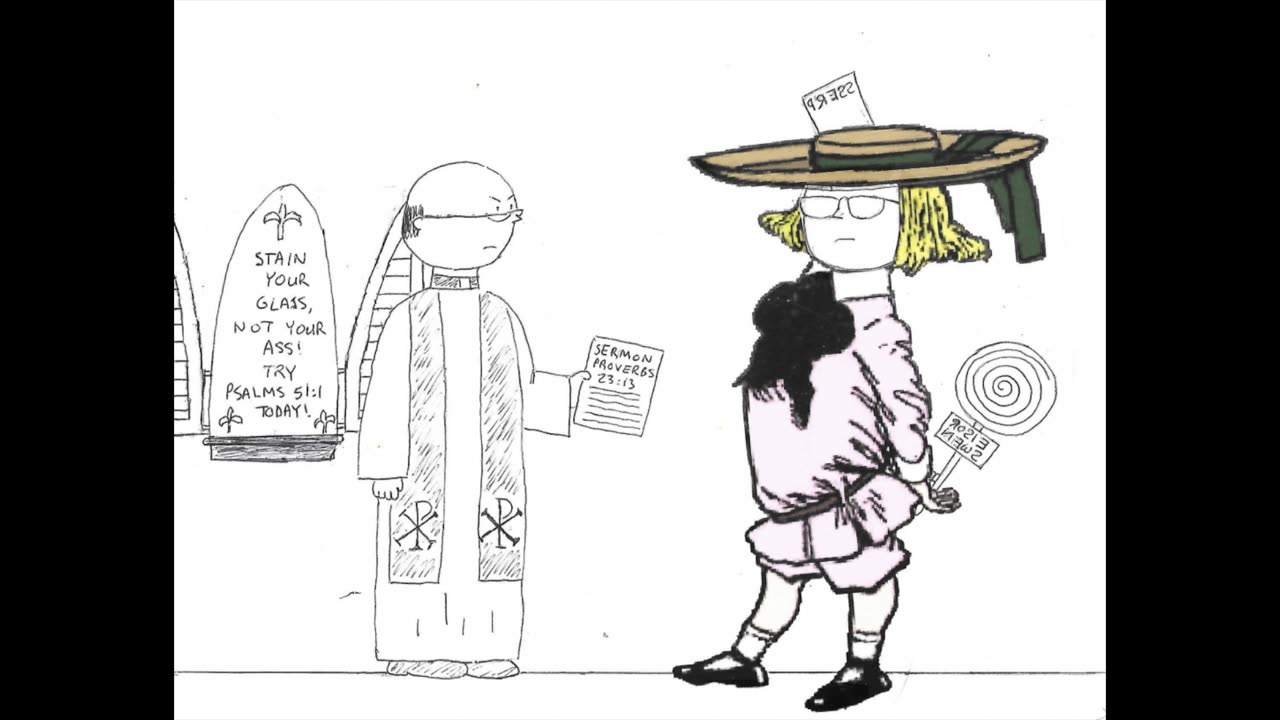Premium Only Content

Out of Context, Out of Mind
One of our troupe members was a psychology student and graduate teaching assistant. One of the psychologists he had to cover during the course of his studies and teaching was the child psychologist Jean Piaget (1896-1980). Piaget’s most famous work was his Theory of Cognitive Development which breaks child development into four stages: sensorimotor (birth to 24 months), preoperational (ages 2-7), concrete operational (7-11), and formal operational (12 through adulthood). This sketch also pokes fun at our favorite journalist, Chairman Rosie, who, in a true Faustian-like interpretation of Matthew 18:3, attempts to earn his ticket to the Kingdom of Heaven by acting as childish as possible (a form of magical thinking if you will, which, incidentally, is a trademark of the preoperational stage) so he can write a scathing exposé of God in order to get Him forcibly removed from His post as President, Chairman and CEO.
1. Hypothetical flanking
The scene is a reference to the question the disciples posed to Jesus prior to Matthew 18:3, specifically Matthew 18:1 (“At that time the disciples came to Jesus and asked “Who, then, is the greatest in the kingdom of heaven?” New International Version). It appears the disciples in this case were merely reporters without the rude shouting and annoying two-parted follow-up questions.
Rosie: “But Don Giovanni loved all and he went to Hell. Do you want to go to Hell, Mommy?”
Mother: “That’s different, dear.”
A reference to Mozart’s opera “Don Giovanni” Act 2, Scene 1 where Giovanni attempts to rationalize his philandering ways: “As I always say, ‘He who remains faithful to one is being cruel to the others’…I have an overabundance of sentiment.” For more on Don Giovanni, see the “Multitaskerade” sketch.
Rosie: “Mommy, my take has always been that if you never had me, your life would not be fulfilling, right?”
Mother: “Well, yes.”
Rosie: “But since you have me in your life, your life is fulfilling. Fair?”
Mother: “I think that’s fair.”
Rosie: “And the best people in life are those that make it fulfilling, right?”
Mother: “Yes, of course.”
Rosie: “Thanks for making me your best, Mom.”
Mother: “That’s not what I meant, dear.”
This part of the sketch was inspired by a dialogue host Kay Adams and co-host Kyle Brandt had with guest contributor (and former National Football League quarterback) Matt Cassel on 30 September 2021 on NFL Network’s “Good Morning, Football.” The debate was on who contributed more to the success of the NFL’s New England Patriots, head coach Bill Belichick or quarterback Tom Brady. The dialogue went something like this:
Kay: (to Matt) “Who’s the genius behind the [New England Patriots] football, behind the Super Bowls, behind the legacy? Is it Brady or is it Belichick?”
Matt then told how Tom and Bill worked together to create the Patriot dynasty, and Matt didn’t really commit to favoring one over the other. Later on in the discussion, Kyle said:
Kyle (to Matt): “My take has always been if Bill Belichick had never met Tom Brady, I don’t think Bill Belichick is a Super Bowl Champion. If Tom Brady had never had Bill Belichick in his life, I think [Tom Brady] has multiple [Super Bowl] rings. Fair? Unfair?”
Matt: “I think it’s fair.”
Then Matt, probably realizing that he just admitted that Tom Brady was the genius, quickly adds:
Matt: “I mean, at the end of the day, let’s be honest, there’s great coaches out there, and Bill Belichick is probably the greatest in our generation, but great players make great coaches.”
Kay and Kyle’s collusion sounded just like a bratty five year old boy asking his mother which one of her children is her favorite, and then when she refused to take sides, the child rephrased the question to get the answer he wanted, entrapping her in the process. Pretentious children are excellent at being journalists who are excellent at being pretentious children.
2. “Everyone is doing it”
In this scene, Chairman Rosie is dressed as Buster Brown, the famous early 20th century comic strip character by Richard F. Outcault. The stained glass window is referring to Psalms 51:1 (“Have mercy on me, O God, because of your unfailing love. Because of your great compassion, blot out the stain of my sins.” (New Living Translation). The subject of Father’s sermon is referring to Proverbs 23:13 (“Don’t fail to punish your children. The rod of punishment won’t kill them.” New Living Translation).
Father: “How many times have I told you not to truncate Bible verses?”
Again, Chairman Rosie is playing fast and loose with the Bible. If he had gone on to read the next verse (Matthew 18:4), he would have discovered that children must be humble as well. (“Therefore, whoever humbles himself like this child is the greatest in the Kingdom of Heaven.” Berean Standard Bible).
Father: “First it was your ‘wages of sin is death’ episode, then it was your first book of John chapter 1 verse 8 tirade, and now this. You stop acting like Dr. Faustus and insulting my intelligence with your oversimplified and dumbed down diatribes this instant, young man!”
Father’s line here refers to two Bible verses prominently mentioned by Faustus in Christopher Marlowe’s play “Dr. Faustus.” “Wages of sin is death” refers to Romans 6:23: “For the wages of sin is death, but the gift of God is eternal life through Jesus Christ our Lord” (King James Version). 1 John 1:8-9 reads: “If we say that we have no sin, we deceive ourselves, and the truth is not in us. If we confess our sins, he is faithful and just to forgive us our sins, and to cleanse us from all unrighteousness.” Faustus only pays attention to the first half of Romans 6:23 (“For the wages of sin is death,”) and 1 John 1:8 (“If we say that we have no sin, we deceive ourselves, and the truth is not in us”) and ignores the rest.
Faustus’s argument is essentially this: Man is imperfect and sins. And sins will only lead to death. However, if we attempt to live a good life to the point that we think we are without sin, we are deceiving ourselves. And self-deception is a sin. So basically Faustus argues that we’re stuck in a Catch-22, that is, “we’re damned if we do and we’re damned if we don’t” (pun intended). Faustus however, fails to see the rest of the story; that is, Faustus only notes the condemnation by God but not the promise of mercy if one repents.
The juxtaposition of Faustus to the press is intentional. The press commonly makes similar misinterpretations of the Bible. For example, we here at CoBaD remember seeing an editorial cartoon several years ago whose subject was an incident where gays were being condemned by the religious right. The cartoonist cited John 8:7 (“He who is without sin cast the first stone”). The cartoonist, however, ignored the rest of the passage when Jesus turns to the accused and says “Go and sin no more” (John 8:11). Taken in its entirety, the Bible passage would suggest that the persons the cartoonist is defending are actually sinners, which meant that the cartoonist is essentially agreeing with the religious right in that homosexuality is wrong. The press in a broader scope does similar things with the teachings of Jesus as well. The press endlessly lecture us ignorant plebeians to forgive like Jesus, but at the same time, the press are strong advocates of kicking Jesus out of the courts and schools.
Father: “This ain’t Second City!” - For more on our (dim) view of Second City Comedy Theatre, see the “Acceptance Spee” sketch.
Father: “I’ll cancel your cankerous and cancerous cancel culture if you keep this cantering cantankerousness up.” – We here at CoBaD love alliterations, don’t you?
3. Don’t Clean Your Plate
Rosie: “NO! I only eat what’s convenient, because my weekly syndicated column, ‘He Who is Without Sin Casts the First Stone,’ is all about the little people who have been harshly inconvenienced: rebels, free thinkers, undocumented workers, gays and me. I’m just fine!”
For an additional example of misuse of “He who is without sin, cast the first stone,” see Professor Londregan's article, “He Who is Without Sin” which explains how to deal with individuals whom, in an indefensible act, deliberately cross the U.S./Mexican border illegally and become victims of exploitation. Professor Londregan, possibly for the sake of appeasing his Ivy League peers, dodges focusing on the “sin” of the illegal immigrants and “casts” the entirety of the blame on Americans whom exploit illegal immigrants. We here at CoBaD argue that if these immigrants hadn’t “sinned” and crossed the border illegally (note Professor Londregan equates these immigrants to prostitutes and drug smugglers), they wouldn’t have put themselves in a compromising position and be exploited by “stone casters” in the first place. So it seems to us here at CoBaD an Ivy League professor’s interpretation of John 8:7 (those that have read the Bible that is) is more likely to read, “Let he who is without defense project the first blame.”
Epilogue
For more on the John Steinbeck School of Overgesticulated Public Speaking, see the “Four Year War Plans and Screw Deals” sketch.
Piaget: “Catprik is clearly past the sensorimotor stage because he has mastered object permanence. Tripack has shown that by covering the coveted Uriah Heep Award in Journalistic Humility with a blanket, the award has not simply disappeared, because he’s not crying and throwing a fit. After two weeks of undercover investigation, he is able to demonstrate the award is still there by cutting a hole in the blanket, pulling it out and parading it around the newsroom, asserting his egocentrism.”
Refers to the blanket test. If one covers an object with a blanket, a child without a sense of object permanence (generally those younger than six months) think the object has disappeared. Basically for infants (and mass media consumers for that matter), out of sight is out of mind.
“The Uriah Heep Award in Journalist Humility” was named after Uriah Heep, the main antagonist from Charles Dickens’s “David Copperfield,” who primary purpose in life is to tell everyone how humble he his. In reality, he is anything but the sort. The childish Chairman Rosie parading the award around the newsroom is yet another indication that he didn’t read Matthew 18:4.
Egocentrism is where an individual is unable to see things from other people’s point of view. When Piaget “makes himself invisible” at the end of this skit he is demonstrating egocentrism. By age 6 or 7 (Piaget’s Concrete Operational Stage), children grow out of this. Maybe.
The “unbreeched” cartoon refers to the practice of breeching boys. Used widely until the end of the 19th century, breeching was considered to be rite of passage where a young boy was first dressed in pants or trousers, usually between the ages of two and eight. Boys were dressed in dresses or gowns until they were able to wear trousers without soiling themselves. The practice was abandoned thanks to advancements in toilet training. The man at the left of the picture is a spoof of the “Civil Conservation Corps Worker Statue" wearing one of Prince Ulrik of Denmark’s (1611-1633) radiant yet poop-friendly floor length skirts. The eyeless and noseless man in the middle was taken from an Illinois CCC promotional poster. Chairman Rosie’s picture is from a photo of a two year old unbreeched Franklin Delano Roosevelt (creator of the CCC) taken in 1884.
Piaget: “Craptik is now happily mature and paying the adult fare on the road to Heaven thanks to his exercising a childish option he found in the First Corinthians section 13, paragraph 11 of his contract.” – Refers to 1 Corinthians 13:11: “When I was a child, I spoke like a child, I thought like a child, I reasoned like a child. When I became a man, I gave up childish ways (English Standard Version).” Looks like Chairman Rose finally read the rest of the terms and policies in his contract. He probably also came across 1 Corinthians 14:20 (“Brothers, do not be children in your thinking. Be infants in evil, but in your thinking be mature.” English Standard Version).
Piaget: “We’ll take a look at press releases from an Old Testament case study from the first book of Reagan, Chapter 17, covering the story of Paul and Goliath, and discover how a 51 year old well-nourished child, armed with only monetary policies from the Federal Reserve Board, slayed the mighty inflation warrior.” - Refers to Paul Volcker (1927-2019), Chair of the Federal Reserve from 1979-1987. Mr. Volcker is widely credited for having ended the high rate of inflation present in the U.S. that lasted from the 1970s to the early 1980s.
Piaget: “And now, time for a wee drink and to make myself invisible. Good night.” - A real life example of egocentrism in preoperational children is when they think they can make themselves invisible by covering their eyes with their hands.
What follows is a spoof of Piaget’s test of conservation. Preoperational children lack the concept of conservation. They think that a tall skinny glass has more liquid in it than a short wide glass, even though the volume of liquid in both is actually the same. This visual gag turns the test of conservation on its ear. All three glasses may contain the exact same amount of fluid (five ounces), but not the same amount of alcohol. It is in fact the five ounce glass of whiskey that Piaget drank that contains the most alcohol by volume (a standard drink is in fact 12 ounces of beer, five ounces of table wine, and 1.5 ounces of spirits). It’s funny how adults laugh at children who fail the conservation test and yet somehow think they’re okay to drive because they only had a couple of “wee drinks.”
Piaget: "Hey, Mom! Try and find me! You can’t see me ‘cause I’m a stealth toaster! - Where a member out our troupe used to work, “stealth toaster” was often used to refer to as a secret project. Sometimes used in conjunction with the term “secret squirrel.” (see the “Four Year War Plans and Screw Deals” sketch).
As a closing note, notice we here at CoBaD didn’t stick to a single translation of the Bible. If you laughed at the disciples trying to ask Jesus as to which of them is the greatest, and chuckled at the antics of Chairman Rosie asking his mom which of his children was the greatest, but was perplexed as to why we didn’t declare one translation of the Bible as the greatest, then you missed the whole point of this sketch.
References:
Bible Hub. https://biblehub.com/
Longredan, J.B. 2012, July 5). Immigration: He Who is Without Sin. Publicdiscourse.com. https://www.thepublicdiscourse.com/2012/07/5794/
Marlowe, Christopher (2002). Doctor Faustus, The 1604-Version Edition. (M. Keefer, Ed.) Broadview Press. (Original work published 1604).
Myers, D. G. (2014). Exploring Psychology (9th edition). Worth Publishers, pp.124-129.
NFL Network. (30 September 2021) Good Morning Football.
Wikipedia. Breeching (boys). https://en.wikipedia.org/wiki/Breeching_(boys)
Wikipedia. Buster Brown. https://en.wikipedia.org/wiki/Buster_Brown
Wikipedia. Civil Conservation Corps. https://en.wikipedia.org/wiki/Civilian_Conservation_Corps
Wikipedia. Paul Volcker. https://en.wikipedia.org/wiki/Paul_Volcker
Wikipedia. Piaget’s Theory of Cognitive Development. https://en.wikipedia.org/wiki/Piaget's_theory_of_cognitive_development
Wikipedia. Standard Drink. https://en.wikipedia.org/wiki/Standard_drink
--------------------
Convulsions of Birth and Death (CoBaD) is a comedy sketch troupe founded in September, 2022 that posts skits on social media covering varied topics such as music, history, art, science, sports, literature and events encountered in everyday life. The title was inspired by Henry David Thoreau’s “Civil Disobedience” (1849), an essay written as a protest against the U.S. government taking his “gift” (i.e., his taxes), and wasting it in ways in which he did not approve (e.g., war and slavery). CoBaD writes sketches in the spirit of Thoreau, but instead of strictly casting its nets outwards towards governments and figures of authority, it projects its protest inwards by taking a humorous, lightheaded look at humanity and specifically those who take the greatest gift of all, life, and senselessly and stupidly waste it on greed, narcissism, self-centeredness, petty-mindedness, arrogance, opportunism, power-grabbing, quid pro quo, the status quo, ulterior motives, and the most horrid waste of all, social media.
-
 1:13:03
1:13:03
Michael Franzese
2 hours agoRATING Trump’s First Two Weeks In Office
18.1K5 -
 1:43:17
1:43:17
Benny Johnson
3 hours agoBREAKING: Mexico SURRENDERS To Trump, Locks Down Border | Mass FBI Firings, Deep State PURGE in DC
61.6K77 -
 1:01:48
1:01:48
Grant Stinchfield
2 hours ago $0.89 earnedTrump's Tariffs are Already Working... Here's Why...
7.17K7 -
 2:02:48
2:02:48
LFA TV
1 day agoTARIFF TRADE WAR! | LIVE FROM AMERICA 2.3.25 11am
52.9K27 -
 LIVE
LIVE
The Dana Show with Dana Loesch
2 hours agoTRUMP IMPOSES TARIFFS ON IMPORTS FROM CANADA, CHINA & MEXICO | The Dana Show LIVE On Rumble!
851 watching -
 LIVE
LIVE
Major League Fishing
5 days agoLIVE! - Bass Pro Tour: Stage 1 - Day 4
150 watching -
 59:38
59:38
The Dan Bongino Show
6 hours agoTrump Is Setting The Old World Order Ablaze (Ep. 2414) - 02/03/2025
620K1.13K -
 1:02:10
1:02:10
The Rubin Report
3 hours agoJD Vance Makes Host Go Quiet with This Brutal Warning for These Major Countries
82.1K58 -
 2:00:51
2:00:51
Steven Crowder
5 hours agoWhy Trump & America Will Dominate the Global Trade War
407K244 -
 1:06:15
1:06:15
vivafrei
17 hours agoLive with "Bitcoin Jesus" Roger Ver - the Indictment, Law-Fare and the War on Crypto
93.4K18